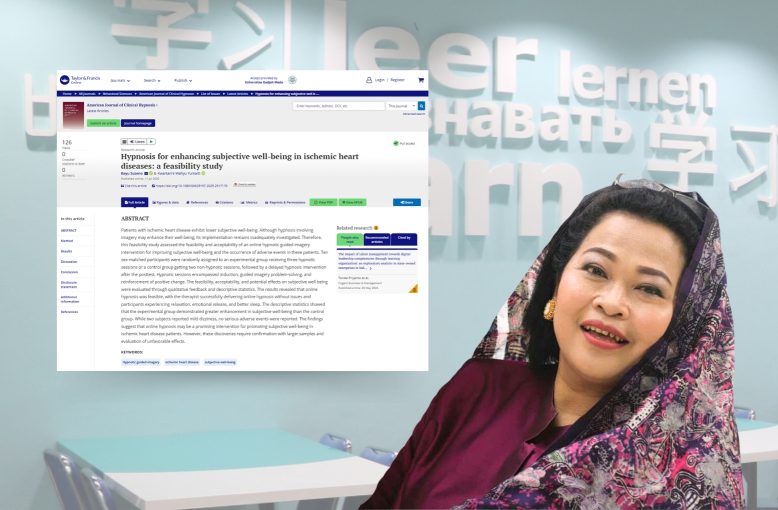
Yogyakarta, July 17, 2025 – Bayu Soseno and Prof. Dra. Kwartarini Wahyu Yuniarti, M.Med.Sc., Ph.D., Psikolog, successfully published their research titled “Hypnosis for enhancing subjective well-being in ischemic heart diseases: a feasibility study” in the American Journal of Clinical Hypnosis (2025), a reputable international journal indexed by Scopus (Q2), with a 2024 SJR of 0.388 and an Impact Factor (IF) of 1.3.
This study explores the effectiveness of Hypnotic Guided Imagery (HGI) as a non-pharmacological approach to enhance subjective well-being in patients with ischemic heart disease. By involving several patients as participants, the study found that the hypnosis intervention is not only safe and well-tolerated but also has the potential to reduce stress while improving calmness and quality of life. This scientific contribution aligns with Universitas Gadjah Mada’s commitment to supporting the Sustainable Development Goals (SDGs), particularly in the area of mental health and the development of evidence-based integrative therapies.
Below are the abstract, keywords, and article link:
Abstract.
Patients with ischemic heart disease exhibit lower subjective well-being. Although hypnosis involving imagery may enhance their well-being, its implementation remains inadequately investigated. Therefore, this feasibility study assessed the feasibility and acceptability of an online hypnotic guided imagery intervention for improving subjective well-being and the occurrence of adverse events in these patients. Ten sex-matched participants were randomly assigned to an experimental group receiving three hypnotic sessions or a control group getting two non-hypnotic sessions, followed by a delayed hypnosis intervention after the posttest. Hypnotic sessions encompassed induction, guided imagery, problem-solving, and reinforcement of positive change. The feasibility, acceptability, and potential effects on subjective well-being were evaluated through qualitative feedback and descriptive statistics. The results revealed that online hypnosis was feasible, with the therapist successfully delivering online hypnosis without issues and participants experiencing relaxation, emotional release, and better sleep. The descriptive statistics showed that the experimental group demonstrated greater enhancement in subjective well-being than the control group. While two subjects reported mild dizziness, no serious adverse events were reported. The findings suggest that online hypnosis may be a promising intervention for promoting subjective well-being in ischemic heart disease patients. However, these discoveries require confirmation with larger samples and evaluation of unfavorable effects.
Keywords: hypnotic guided imagery, ischemic heart disease, subjective well-being
Access the publication via this link:
https://www.tandfonline.com/doi/full/10.1080/00029157.2025.2517170
Based on the keywords, this article contributes to SDG 3: Good Health and Well-being.
Congratulations to Prof. Kwartarini and the research team.
Writer & Editor: UP & Public Relations Team
